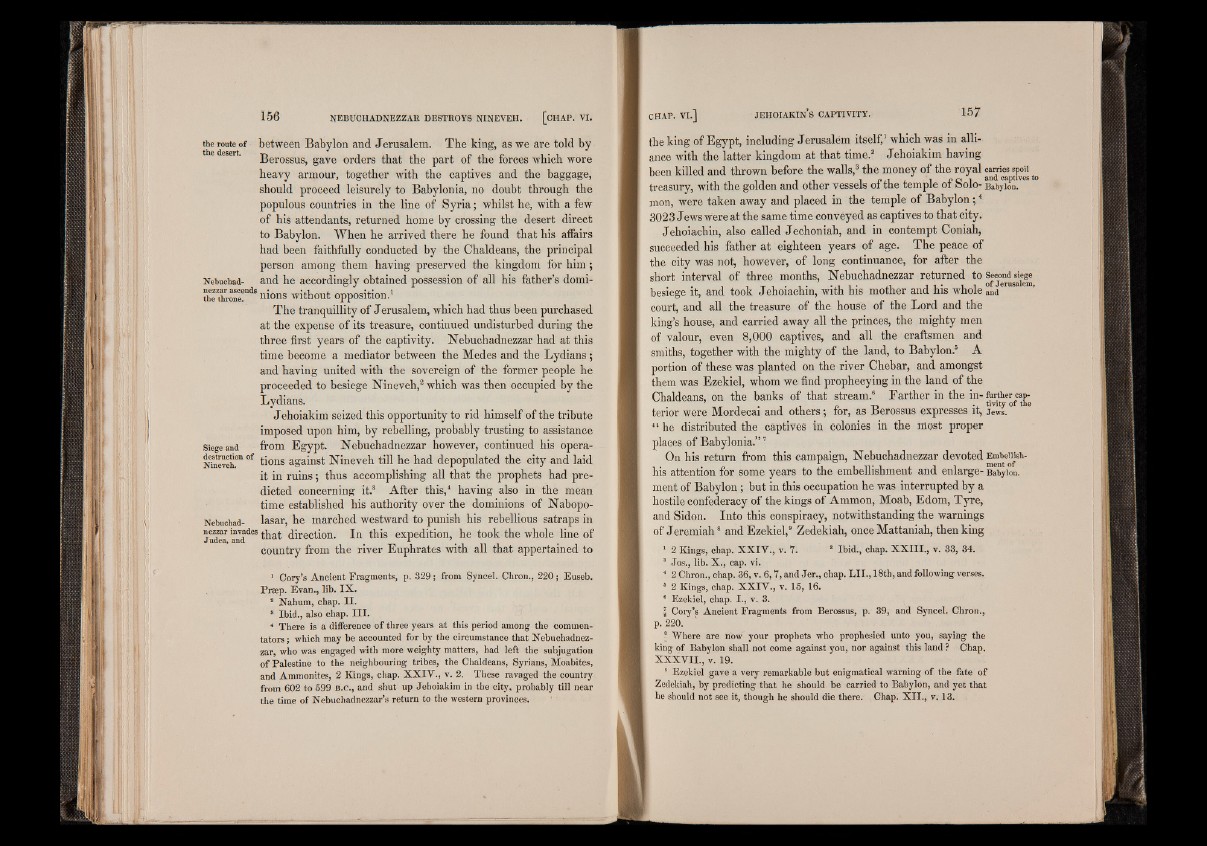
NEBUCHADNEZZAR DESTROYS NINEVEH. [CHAP. VI.
the route of between Babylon and Jerusalem. The king, as we are told by
Berossus, gave orders that the part of the forces which wore
heavy armour, together with the captives and the baggage,
should proceed leisurely to Babylonia, no doubt through the
populous countries in the line of Syria; whilst he, with a few
of his attendants, returned home by crossing the desert direct
to Babylon. When he arrived there he found that his affairs
had been faithfully conducted by the Chaldeans, the principal
person among them having preserved the kingdom for him;
Nebuchad- and he accordingly obtained possession of all his father’s domi-
the tome?nds Dions without opposition.1
The tranquillity of Jerusalem, which had thus been purchased
at the expense of its treasure, continued undisturbed during the
three first years of the captivity. Nebuchadnezzar had at this
time become a mediator between the Medes and the Lydians;
and having united with the sovereign of the former people he
proceeded to besiege Nineveh,2 which was then occupied by the
Lydians.
Jehoiakim seized this opportunity to rid himself of the tribute
imposed upon him, by rebelling, probably trusting to assistance
Siege and from Egypt. Nebuchadnezzar however, continued his opera-
Nineveh™ °f tions against Nineveh till he had depopulated the city and laid
it in ruins; thus accomplishing all that the prophets had predicted
concerning it.3 After this,4 having also in the mean
time established his authority over the dominions of Nabopo-
Nebuchad- lasar, he marched westward to punish his rebellious satraps in
J n d e r an d deS that direction. In this expedition, he took the whole line of
country from the river Euphrates with all that appertained to
1 Cory’s Ancient Fragments, p. 329; from Syncel. Chron., 220; Euseb.
Prsep. Evan., lib. IX .
2 Nahum, chap. I I .
8 Ibid., also chap. I I I .
4 There is a difference of three years at this period among the commentators
; which may he accounted for by the circumstance that Nebuchadnezzar,
who was engaged with more weighty matters, had left the subjugation
of Palestine to the neighbouring tribes, the Chaldeans, Syrians, Moabites,
and Ammonites, 2 Kings, chap. X X IV ., v. 2. These ravaged the country
ftom 602 to 599 B.C., and shut up Jehoiakim in the city, probably till near
the time of Nebuchadnezzar’s return to the western provinces.
the king of Egypt, including Jerusalem itself,1 which was in alliance
with the latter kingdom at that time.2 J ehoiakim having
been killed and thrown before the walls,3 the money of the royal ca™ spoil ^
treasury, with the golden and other vessels of the temple of Solo- Babylon,
mon, were taken away and placed in the temple of Babylon;4
3023 Jews were at the same time conveyed as captives to that city.
Jehoiachin, also called Jechoniah, and in contempt Coniah,
succeeded his father at eighteen years of age. The peace of
the city was not, however, of long continuance, for after the
short interval of three months, Nebuchadnezzar returned to Second sk-ge
besiege it, and took Jehoiachin, with his mother and his whole and
court, and all the treasure of the house of the Lord and the
king’s house, and carried away all the princes, the mighty men
of valour, even 8,000 captives, and all the craftsmen and
smiths, together with the mighty of the land, to Babylon.6 A
portion of these was planted on the river Chebar, and amongst
them was Ezekiel, whom we find prophecying in the land of the
Chaldeans, on the banks of that stream.6 Farther in the in- farther cap-
7 . n t* • a tivity of the terior were Mordecai and others; for, as Berossus expresses it, jews.
“ he distributed the captives in colonies in the most proper
places of Babylonia.” 7
On his return from this campaign, Nebuchadnezzar devoted EmbeUish-
his attention for some years to the embellishment and enlarge- Babylon,
ment of Babylon; but in this occupation he was interrupted by a
hostile confederacy of the kings of Ammon, Moab, Edom, Tyre,
and Sidon. Into this conspiracy, notwithstanding the warnings
of Jeremiah8 and Ezekiel,9 Zedekiah, once Mattaniah, then king
1 2 Kings, chap. X X IV ., v. 7. 2 Ibid., chap. X X I I I ., v. 33, 34.
8 Jos., lib. X., cap. vi.
4 2 Chron., chap. 36, v. 6 ,7 , and Je r,, chap. L I I ., 18th, and following verses.
5 2 Kings, chap. X X IV ., v. 15, 16.
6 Ezekiel, chap. I., v. 3.
\ Cory’s Ancient Fragments from Berossus, p. 39, and Syncel. Chron.,
p. 220.
8 Where are how your prophets who prophesied unto you, saying the
king of Babylon shall not come against you, nor against this land ? Chap.
X X X V II., v. 19.
8 Ezekiel gave a very remarkable but enigmatical warning of the fate of
Zedekiah, by predicting that he should be carried to Babylon, and yet that
he should not see it, though he should die there. Chap. X I I ., v. 13.